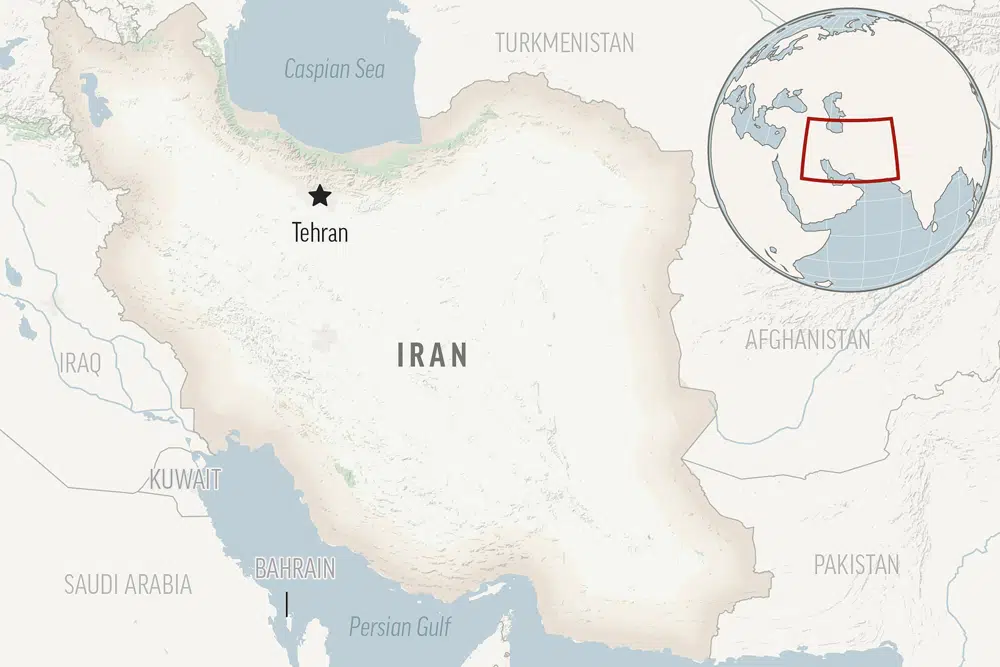DUBAI, United Arab Emirates (AP) — Iran on Thursday blamed Israel for a drone attack that targeted a military workshop in its central city of Isfahan over the weekend, warning that it “reserves its legitimate and inherent right” to retaliate.
Iran’s mission to the United Nations, in a letter it published on its website, attributed the attack , which happened late Saturday, to Israel.
“Early investigations suggest that the Israeli regime was responsible for this attempted act of aggression,” the letter signed by Iranian Ambassador Amir Saeid Iravani said. The letter did not elaborate on what evidence supported Iran’s suspicion.
Israeli officials declined to comment. However, Israel has carried out a series of attacks targeting Iran’s nuclear program and other sites since the collapse of Tehran’s 2015 nuclear deal with world powers as part of a yearslong shadow war between the Mideast rivals.
Details on the Isfahan attack, which happened around 11:30 p.m. Saturday, still remain scarce, days after the assault. A Defense Ministry statement said three drones were launched at the facility, with two of them successfully shot down. A third apparently made it through to strike the building, causing “minor damage” to its roof and wounding no one, the ministry said.
Iran’s state-run IRNA news agency later described the drones as “quadcopters equipped with bomblets.” Quadcopters, which get their name from having four rotors, typically operate from short ranges by remote control. Iranian state television later aired footage of debris from the drones, which resembled commercially available quadcopters.
It remains unclear what the workshop produced. Iravani referred to it only as a “a workshop complex of the Iranian Defense Ministry” in his letter.
Israel had been initially suspected as possibly being behind the attack. Iran’s Intelligence Ministry in July claimed to have broken up a plot to target sensitive sites around Isfahan.
A segment aired on Iranian state television in October included purported confessions by alleged members of Komala, a Kurdish opposition party that is exiled from Iran and now is based in Iraq, that they planned to target a military aerospace facility in Isfahan after being trained by Israel’s Mossad intelligence service. However, activists say Iran has aired hundreds of coerced confession on state TV over the last decade.
Iravani’s letter to U.N. Secretary-General Antonio Guterres and the Security Council warned that Tehran could respond to the attack.
“The Islamic Republic of Iran reserves its legitimate and inherent right … to defend its national security and respond resolutely to any threats or wrongful actions by the Israeli regime, wherever and whenever deemed necessary,” the letter read.
Israeli officials rarely acknowledge operations carried out by the country’s secret military units or its Mossad intelligence agency. However, Israeli Prime Minister Benjamin Netanyahu, who recently re-entered the premiership, has long considered Iran to be the biggest threat to his nation.
Iravani’s letter separately complained about Mykhailo Podolyak, an adviser to Ukrainian President Ukrainian President Volodymyr Zelenskyy, who tweeted after the drone attack: “Explosive night in Iran … Ukraine had warned you.” Iran has supplied Russia with bomb-carrying drones that Moscow has used to target power plants and civilian sites in Ukraine in its war on the country.
Meanwhile Thursday, the head of Iran’s civilian nuclear program disputed comments by the International Atomic Energy Agency over Iranian enrichment operations at Fordo. The facility sits under a mountain near the holy Shiite city of Qom, some 90 kilometers (55 miles) southwest of Tehran, and has long been a worry for the West — it was initially built in secret and with the likely ability to withstand airstrikes.
The U.N. nuclear watchdog on Wednesday said its inspector conducted an unannounced visit to the underground facility and found two cascades of advanced IR-6 centrifuges “interconnected in a way that was substantially different from the mode of operation declared by Iran to the agency in November last year.”
The IAEA did not elaborate on what that meant, though the agency described it as “a substantial change.” Those cascades now enrich uranium up to 60% purity — a short, technical step from weapons-grade levels of 90%.
Responding the IAEA, Mohammad Eslami of the Atomic Energy Organization of Iran claimed the inspector had been wrong and clarified their remarks to the watchdog.
“During a visit to inspect what is done at Fordo, (the inspector) had an impression which was not correct and they immediately reported this to the IAEA in writing,” Eslami claimed. “We sent our senior safeguard representative along with that same inspector to Fordo again, and they realized that their understanding was not correct.”
The IAEA said Thursday it stood by its earlier assessment.









